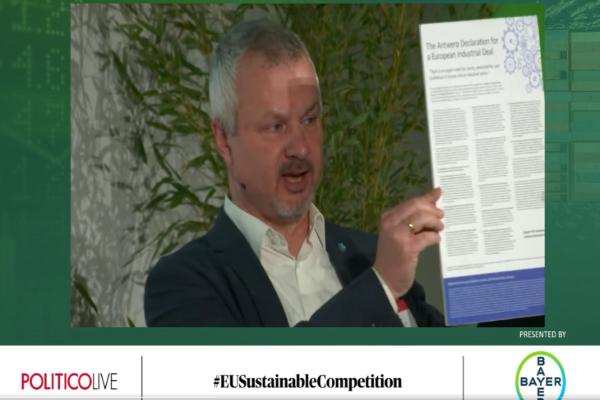How to balance competitiveness with Europe’s sustainability goals?

Photo Credit: CEFIC
European competitiveness is high on the agenda of many ongoing discussions at European and national level. As industry faces the most severe economic downturn in a decade, support for the Antwerp Declaration for a European Industrial Deal continues to grow reaching over 800 signatories. The Antwerp Declaration advocates for the European Industrial Deal to be at the core of the new European Strategic Agenda, with a Commission Vice President designated to oversee its implementation.
During a recent discussion ‘Europe’s road to sustainable competitiveness’ organised by POLITICO, the question was debated: how to balance competitiveness with Europe’s sustainability goals?
Since the Antwerp Declaration was launched one month ago, companies, associations, trade unions, educational and research institutions, continue to rally in support of a European Industrial Deal which supports the business case for investments, and drives the implementation of the EU Green Deal goals. Joining the panel, Marco Mensink, Cefic Director General set the scene of industry challenges and needs: “We need the biggest investments in history in the shortest amount of time, in the middle of an economic downturn, with the IRA coming and with one extra puzzle piece: if we double electricity production but demand goes faster electricity prices will go through the roof. So Commission, get us as many green electrons as we can get, and get us the infrastructure to make this happen.”
Support for a real industrial strategy was echoed by the European Commission’s Kurt Vandenberghe, Director-General of the Directorate-General for Climate Action (DG CLIMA) who, referring to the communication of the 2040 climate targets, stated that a Green Deal Industrial Strategy will be a key instrument: “Between now and 2030, we do not need more rules, we need more stability…What matters now is that we implement what we have agreed. That means investment…It also means developing and implementing a real industrial strategy.”
The Industrial Deal must be a fully-integrated European approach, called Johan Hanssens, Secretary General, Department of Economy, Science and Innovation at the Flemish government. Hanssens called on Europe to set predictable regulation and create the right framework conditions for industry to meet the target. “Because it is about regulation, but it is also about infrastructure, skills, competences, energy, trade policy, and you have to combine all these policy domains in an integrated way…That will be a target for the next Commission: to have a holistic, integrated, comprehensive industrial policy”.
Not only a coherent policy agenda will be key but having a harmonised European approach across Member States will be another important angle, commented, German Member of the European Parliament, Terry Reintke (Greens/EFA): “There will be tensions about infrastructure and what industries need to be supported. The only way to get there is to talk about it is on a European level. Having 27 different strategies is not going to work”.
Subscribe to our newsletter & stay updated.